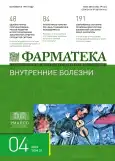Approaches to the diagnosis and treatment of patients with stage III–IV non-small cell lung cancer in Russia. Preliminary results of a retrospective multicenter non-interventional observational study
- Authors: Reutova E.V.1, Laktionov K.K.1
-
Affiliations:
- National Medical Research Center for Oncology n.a. N.N. Blokhin
- Issue: Vol 31, No 4 (2024)
- Pages: 199-204
- Section: Oncology
- URL: https://bakhtiniada.ru/2073-4034/article/view/270903
- DOI: https://doi.org/10.18565/pharmateca.2024.4.199-204
- ID: 270903
Cite item
Abstract
Background. To understand current practices in the diagnosis and treatment of lung cancer (LC) in the Russian Federation, a retrospective analysis of data in Russian routine clinical practice was conducted.
Objective. Evaluation of the key aspects of diagnosis and treatment of advanced non-small cell lung cancer (NSCLC) in real practice based on data from a retrospective study. Retrospective analysis of the approaches to the diagnosis and treatment of advanced NSCLC available in practical oncopulmonology.
Methods. We analyzed 800 patient records of patients treated for locally advanced or metastatic NSCLC at 29 centers between November 1, 2020 and March 1, 2022.
Results. Molecular genetic studies were performed to varying extents: of 244 (47.4%, 244/514) patients with adenocarcinoma, activating mutations in the EGFR gene were determined in 90.2% (220/244) of patients, ALK translocations were determined in 68.9 (168/244); ROS-1 – in 52.9% (129/244), mutations in the BRAF V600E gene – in 39.3% (202/244), KRAS – in 13.5% (33/244). Immunohistochemical testing to determine the PD-L1 expression level was performed in 44% (226/514) of patients. In the first line of therapy, 153/514 (29.8%) patients with unresectable stage III NSCLC received chemoradiotherapy (CRT), of which 82% (125/153) received sequential CRT. Initially, chemotherapy (CT) was prescribed to 64.7% (333/514) of patients with stage IV NSCLC. 156 (30.4%) of 514 patients received immuno-oncology drugs in the first line, and 25 (50%) of 50 patients with identified activating mutations received targeted drugs. 145 (28.2%) of 514 patients received second line drug therapy. Of these, chemotherapy – 84 patients with NSCLC, immunotherapy – 55 out of 145 patients, mainly in the form of monoimmunotherapy (83.6%, 46/55), targeted therapy – 6 patients.
Conclusion. The results obtained provide a comprehensive understanding of approaches to the diagnosis and treatment of locally advanced and metastatic NSCLC in the Russian Federation. The data obtained during the study reflect real practice and can be used in solving current problems of practical oncopulmonology.
Full Text
##article.viewOnOriginalSite##About the authors
Elena V. Reutova
National Medical Research Center for Oncology n.a. N.N. Blokhin
Author for correspondence.
Email: ereutova@rambler.ru
Cand. Sci. (Med.), Oncologist, Senior Researcher at the Department of Antitumor Drug Therapy No. 3
Russian Federation, MoscowK. K. Laktionov
National Medical Research Center for Oncology n.a. N.N. Blokhin
Email: ereutova@rambler.ru
Russian Federation, Moscow
References
- Sung Hyuna, et al. “Global Cancer Statistics 2020: GLOBOCAN Estimates of Incidence and Mortality Worldwide for 36 Cancers in 185 Countries.” CA: Сancer J Clin. 2021;71(3):209–49. doi: 10.3322/caac.21660.
- Jemal A., Bray F., Center M.M., et al. Global cancer statistics. CA Cancer J Clin. 2011;61:69–90.
- World Health Organization. Global cancer burden growing, amidst mounting need for services. February 1, 2024. URL: https://shorturl.at/pLNU7 (Accessed February 2, 2024).
- Каприн А.Д., Старинский В.В., Шахзадова А.О. (ред.) Состояние онкологической помощи населению России в 2021 г. М., 2022. 239 с. [Kaprin A.D., Starinsky V.V., Shakhzadova A.O. (eds.) The state of oncological care for the population of Russia in 2021. M., 2022. 239 p. (In Russ.)].
- Duma Narjust, et al. “Non-Small Cell Lung Cancer: Epidemiology, Screening, Diagnosis, and Treatment.” Mayo Clin Proceedings. 2019;94(8):1623–40. doi: 10.1016/j.mayocp.2019.01.013.
- Лактионов К.К., Артамонова Е.В., Бредер В.В. и др. Практические рекомендации по лекарственному лечению немелкоклеточного рака легкого. Практические рекомендации RUSSCO, часть 1. Злокачественные опухоли. 2023;13(#3s2):42–65. [Laktionov K.K., Artamonova E.V., Breder V.V., et al. Practical recommendations for drug treatment of non-small cell lung cancer. Practical recommendations RUSSCO, part 1. Malignant tumors. 2023;13(#3s2):42–65. (In Russ.)].
- Клинические рекомендации Минздрава России. Злокачественное новообразование бронхов и легкого. Год утверждения: 2022. [Clinical guidelines of the Ministry of Health of Russia. Malignant neoplasm of the bronchi and lung. Year of approval: 2022. (In Russ.)].
- Non-Small Cell Lung Cancer Collaborative Group. Chemotherapy in non-small cell lung cancer: a meta-analysis using updated data on individual patients from 52 randomised clinical trials. BMJ. 1995;311(7010):899–909.
- NSCLC Meta-Analyses Collaborative Group. Chemotherapy in addition to supportive care improves survival in advanced non-small-cell lung cancer: a systematic review and meta-analysis of individual patient data from 16 randomized controlled trials. J Clin Oncol. 2008;26(28):4617–25.
- Nagano Tatsuya, et al. Molecular Mechanisms and Targeted Therapies Including Immunotherapy for Non-Small Cell Lung Cancer. Curr. Cancer Drug Targets. 2019;19(8):595–630. doi: 10.2174/1568009619666181210114559.
- Patel Sh.A., Weiss J. Advances in the Treatment of Non-Small Cell Lung Cancer: Immunotherapy. Clin Chest Med. 2020;41(2):237–47. doi: 10.1016/j.ccm.2020.02.010.
- Malvicini M., et al. Optimal Therapeutic Strategy for PD-L1 Negative Metastatic Non-Small Cell Lung Cancer: A Decision-Making Guide Based on Clinicopathological and Molecular Features. Curr Treatm Option Oncol. 2023;24(11):1550–67. doi: 10.1007/s11864-023-01132-w.
- Simeone J.C., Nordstrom B.L., Patel K., Klein A.B. Treatment patterns and overall survival in metastatic non-small-cell lung cancer in a real-world, US setting. Future Oncol. 2019;15(30):3491–502. doi: 10.2217/fon-2019-0348.
- Yin Xiaomeng, et al. Small cell lung cancer transformation: From pathogenesis to treatment. Seminars Cancer Biol. 2022;86(Pt. 2):595–606. doi: 10.1016/j.semcancer.2022.03.006.
- Gao Jie, et al. Comparison of Next-Generation Sequencing, Quantitative PCR, and Sanger Sequencing for Mutation Profiling of EGFR, KRAS, PIK3CA and BRAF in Clinical Lung Tumors. Clin Labor. 2016;62(4):689–96. doi: 10.7754/clin.lab.2015.150837.
- Kruglyak K.M., et al. Next-Generation Sequencing and Applications to the Diagnosis and Treatment of Lung Cancer. Adv Exper Med Boil. 2016;890:123–36. doi: 10.1007/978-3-319-24932-2_7.
- Chevallier M., Borgeaud M., Addeo A., Friedlaender A. Oncogenic driver mutations in non-small cell lung cancer: past, present and future. W J Clin Oncol. 2021;12(4):217–37. doi: 10.5306/wjco.v12.i4.217.
- Hendriks L.E., et al. Oncogene-addicted metastatic non-small-cell lung cancer: ESMO Clinical Practice Guideline for diagnosis, treatment and follow-up. Ann Oncol. 2023:S0923-7534(22)04781-0.
Supplementary files









